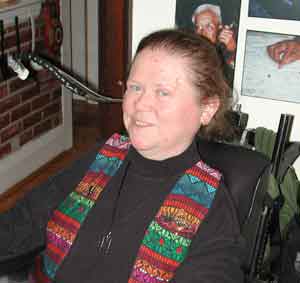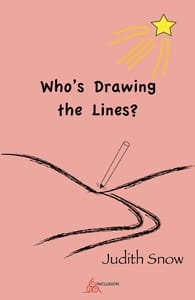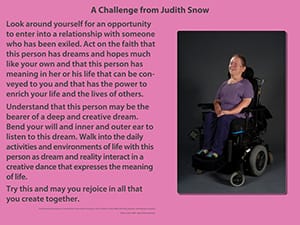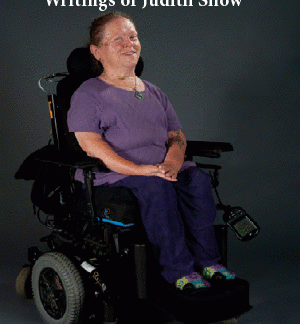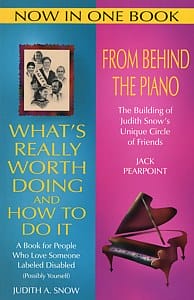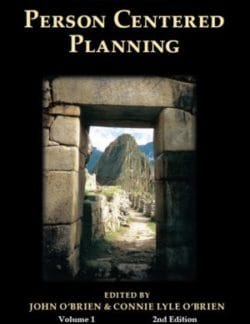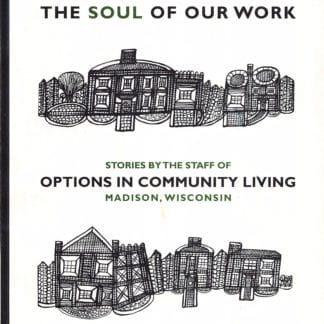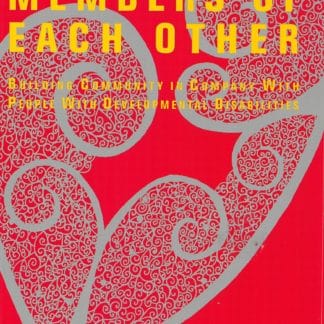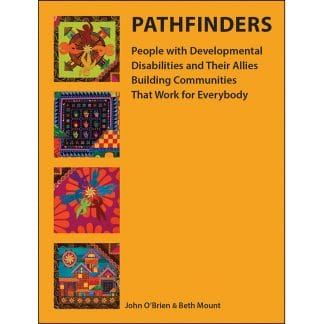by Judith A. Snow
A Summary:
Judith Snow is still a gifted and visionary thinker – and so this writing about Dreaming, Giftedness is ultimately about relearning now to listen – so we can Dream the new Communities we so desperately want and need. Judith always began with a story – and so she begins….
First, A Story
For many years I have known and learned from a young man named Peter. He is now in his early twenties and when I first met him he was 12 or 13 years old. I like to tell people about Peter because in reflecting on the events of his life I have been introduced to many realities about how people can achieve positive community together.
Peter is a person who doesn’t speak. He uses no verbal language and he employs only 3 signs. The sign he use most reliably is the one for “more,” usually to indicate that he would like to continue to eat. Peter does walk and with a great deal of assistance and guidance he looks after his own personal needs. He enjoys participating in a variety of simple daily tasks such as setting table for a meal, serving food, and the like. He often enjoys swimming or listening to music, but otherwise is not particularly athletic or recreationally minded. He is usually comfortable just hanging around with a “gang” of familiar friends. Many people would label Peter severely mentally retarded.
When I first met Peter he had just finished elementary school. For two years he had been part of a regular class of students at a private school which was consciously trying to provide the best educational opportunities to a diverse group of children whose families could afford to send them to that school. His participation with the other students and in the curriculum was supported by a young woman whose role was to do what was necessary to maintain the students’ and teacher’s connection to Peter. The family had borne the cost of Cammie’s presence in the school.
When Peter’s days at elementary school were finished his parents had few options for further schooling for him. There were no junior high schools where Peter would be welcome to participate with “regular” teenagers. Among segregated schools and classes Peter was offered only a place where he would share his days with a small number of students, all of whom had significant difficulties in learning and speech, often coupled with physical limitations. Peter’s parents struggled with the school system to gain, at a minimum, Peter’s participation with children who spoke. But they were refused even this source of stimulation and challenge for him.
Let me say at this point that Peter’s family recognized that he had very important gifts; in particular the gift of trust. Peter is unable to predict a great deal about the world around him. When he enters places he has never been before, for example when he climbs a flight of stairs that he has never been up before, he cannot know that there will be a room at the top of those stairs, complete with a floor, ceiling, perhaps chairs to sit on, perhaps food to eat. This uncertainty disappears after a first experience with a new place, but it also can be very difficult for Peter to know where he is going at any given time. He simply doesn’t have the language to have a conversation with people about where he is going with them and what they will be doing there. In spite of this Peter likes to go places with people and will often go happily where he has never been before, expressing complete confidence in his guides.
At the special school, when Peter was about 14, his family and friends began to notice a real change in him. Inside the classroom he spent more and more time sitting quietly by himself flipping the end of his sock back and forth. In this state, called “disappearing” by his mother, he became increasingly less interested in doing even the few things that went on in the classroom that he enjoyed; things like getting out lunch bags and arranging the room for the noon meal. When Peter was doing something he did enjoy like swinging in the schoolyard it became difficult to coax him to move on to a new activity. He began to resist other’s guidance frequently. What was happening to Peter’s great gift of trust? If he learned to resist other’s guidance how could he live anything but a very restricted life? His parents and friends were deeply worried.
After trying unsuccessfully to get Peter’s school principal to move him to a more stimulating class, his parents decided to hire someone to go to school with him. With their own money they recruited a young man, David: an artist who had extensive experience with the sort of life situations that often confront people labeled handicapped. David’s fundamental job description was to find interesting things for Peter to do at school, helping him to keep connected with his world.
Within three weeks David was saying that either Peter and he had to get out of that school or he would have to resign. The basic problem was that there was nothing of genuine interest or importance happening at that school and so there was nothing to connect Peter to. David was going crazy there, much less Peter!
Peter’s parents were faced with a real crisis. They feared that if they withdrew Peter from the “special” school system and if things did not work, their relationship with the segregated school board could be difficult to establish again. However they knew that David wasn’t exaggerating and that Peter was losing ground. They decided with great trepidation to permit David to withdraw Peter from school.
And so David and Peter began to wander the city of Toronto. There was some direction to their travels but not much. They created a list of friends’ homes to visit on a frequent basis. They tended to follow the subway line because David doesn’t drive. They often dropped in on coffee or doughnut shops or grocery stores because there their presence wouldn’t be remarkable and because Peter likes food. Here and there they found jobs that they could do for neighbours like sorting stuff or stowing boxes. Often they seemed to be just wandering.
In a short period of time David contacted a number of alternative high schools run by the public school board. At one in particular he found a friendly welcome. The administrator took the opportunity to get to know David and Peter better. After continued exploration it seemed that the students also were interested in Peter and had some ideas about how he could participate with them. The structure of the school allowed the students some real say in the way their curriculum was developed. It became clear that at this school there would again be a genuine opportunity for Peter to be involved with his peers in interesting ways. David and Peter were once again going to school.
Peter soon had several regular activities. His day would often include setting up the cafeteria for lunch and tidying up after. Food preparation for himself and others, and eating, were regular events along with frequent trips at recess and breaks to the local coffee shop with other students. Students worked with Peter on different ways that he could enjoy using the class computer. David and Peter often handled the mail for their school plus another high school near by.
But perhaps the most unpredictable activity that Peter got involved with was a sound poetry class. It seems that there is a form of poetry based on inarticulate sounds, building words and phrases around the impressions that these sounds evoke in the artist. The students were fascinated by the sounds that Peter makes and, at one of the planning sessions that were held to design Peter’s participation at school, the idea was born to have a sound poetry class. The class was coordinated by a friend of David’s who is a poet, and the students, including Peter, worked on a variety of compositions based on his and other people’s sounds. At the end of the year the class put on a performance at a small club in downtown Toronto, with Peter taking part in the show.
After approximately two years at this school it seemed time to move on. Peter was now 17, an age when many teenagers are thinking of leaving school. David and Peter hit the bricks again. But this time there was a great deal more focus in their travels about town.
David lived in the west end of Toronto, occupying a former warehouse where he had plenty of room to construct large sculptures. His neighbourhood was culturally and functionally diverse with a rich variety of people and activities in all sorts of small interesting places. Peter lived in a much more subdued part of town. David decided to bring him daily to be part of the general hubbub of the west end. Once again in a remarkably short period of time a pattern began to emerge.
Daily the pair would travel throughout the neighbourhood and along the east-west subway line. Frequent stops included coffee and cheese shops, small stores, and local churches. They had time and inclination to stop and chat, have a snack, do a chore or run an errand. David soon discovered that there were small organizations in the area, working on a shoestring to achieve a more peaceful world, a cleaner environment, or other similar projects. Peter and David began to help runoff brochures, get mailings out, deliver packages in the area, etc. In a short time they were just part of the regular scene, fulfilling their very much appreciated function. Peter was chosen as Volunteer of the Year one Christmas and was written up in the local newspaper.
Other neighbours took notice of the presence and activities of Peter and David. People on the regular route would talk about this pair to each other, and if David happened to be seen without Peter people would enquire about Peter’s health and whereabouts. A local United Church minister opened his church hall for meetings of people interested in responding better to the lives of vulnerable people among us. Neighbours began to talk about the west end as a community. Peter’s parents moved in to the area to foster and be part of this new life.
One of the frequent stops became the residence of some Anglican monks. Quite possibly the initial attraction was that these men liked to put on some of the best lunches in town. But one of the monks was the priest at the nearby Anglican church and he invited Peter and David to participate in the Sunday service with him. Soon after that he invited Peter to serve the alter during the Eucharist. Peter continues in this role more than two years later. The priest says that this is one of the best things that has ever happened to him and the parish.
You see, one of Peter’s greatest gifts is that he likes food, and the communion service is all about sharing a deeply significant meal as a community, rich and poor, young and old, stable and vulnerable together in the presence of a God who is Himself our food and nurturer. In his deep, respectful and radiant understanding that a meal is being prepared and served, Peter recalls the priest and the congregation to a renewed appreciation of their shared ritual.
In a short time the brothers began to invite families with “different” children and other vulnerable members of the parish to take a more active role in the community life. Some began to be altar servers as well and others began to be involved in other ways. All expressed that they felt welcome in a way which was virtually unique in their lives. The congregation came to life with a renewed interest. Meetings were held to decide how the congregation could respond more effectively to their vulnerable members. They looked for a way to help these people find the supports they require so that they would not be forced to move out of the neighbourhood into group homes and nursing homes.
The congregation decided to set up a trust fund to help raise funds and channel government dollars for hands-on support to these vulnerable members. In addition a group formed a planning and action body to help each of the effected families and individuals clarify their needs, prepare proposals and find the necessary resources and personal support.
All this is the result in good part of the presence and participation of Peter, a young man who has never spoken and who is labeled by health professionals as severely mentally retarded. Yet within the space of less than 6 years and while still in his teens Peter’s impact on his community rivals that of most mature, active, capable and able-bodied, adult citizens. Peter has been a poet, food handler, odd-job man, messenger, neighbourhood organizer, peace activist, community builder and evangelist. He has never acted alone but few successful people do. David and others have been key to every development, but the impetus has come from Peter.
Reflecting on these facts has caused me to notice and learn much about what it means to be a fulfilled human being. Peter’s contribution has also caused me to think about what it could mean to be a person who doesn’t speak. Finally Peter’s life, as well my own physical disability and my reflections on the lives of others who have been labeled handicapped, have caused me to ponder many issues around disability itself. I am writing this to bring you Peter’s story and some of my ponderings as well.
Gifts
Once my father told me that in ancient China the very rich or powerful families would bind the feet of young girls. As these girls grew up they became unable to walk more than a few hobbled steps. If a woman were truly rich and powerful she would give up walking altogether and she would also grow her finger nails until her hands were heavy and functionless. She would be carried about all day by slaves who bore her chair and her cushions to support her hands. They would feed her and look after her every need.
Now what is interesting to me about this story, and the reason my father told it to me, is that my body works as if I were one of those ancient Chinese ladies. I get around in a fancy motorized wheelchair and a van adapted with a wheelchair lift. I type on a computer with a breath control that reads my puffs and sips as Morse Code and translates the code into letters and computer controls. Otherwise my every physical need from eating to driving the van must be met by a team of attendants. These attendants cover a 24 hour shift and their wages are funded with government dollars.
One critical difference between my life and that of an ancient Chinese lady is that she was considered to be of value in her society just because she was there. Her mere presence as a symbol was of more value than any other potential contribution she could make and she was supported and shaped through great suffering to become that symbol.
In my world, people are valued according to their conspicuous function and activity. Few things are viewed more negatively than disability in my society. People with apparent disabilities are usually subjected to endless efforts to “cure” them or, like Peter, educate them out of their differences. All the time this is going on they are also being segregated out of everyday life and being denied ordinary, obviously desirable experiences such as work, play, income, friends and intimacy. In a great many parts of our society people with disabilities are also being selected for death. Today doctors regularly use amniocentesis to discover Down Syndrome, (which Peter has), or Muscular Dystrophy, (which I have), or Spinal Bifida, and then recommend abortion for this reason only. Others are denied ordinary health care or important services, leading to death from treatable infections, starvation, etc.
Many years ago I started to ponder how one society could value one physical and mental state so highly that people would put their children through torture to ensure they attained it while another would value the same state so negatively that it would kill any children if possible if they happened to develop it. Even more important to me, I began to try to figure out how people could be persuaded that disability is not a threat. Although disability may be viewed as negative itself that does not mean that the people who are disabled could not be seen as also embodying other possibilities. On the other hand is disability so negative as to have no redeeming qualities to celebrate.
Here is an important clue I had. People who know a person with a handicap very well, someone such as a parent, sibling or a family friend, will often say about that individual that they are a wonderful person and that this was not apparent to them at first. For example, a young man I know is a person who doesn’t speak. He is attending a neighbourhood high school. His support circle publishes a newsletter for family and friends to tell of his goings-on. In a recent edition of his newsletter the support worker made a point of saying how unexpectedly enjoyable her time with him has been.
My point is both that people virtually always discover something that brings them pleasure when they get to know someone who is labeled handicapped and that this pleasurable discovery virtually always comes as a genuine surprise. But when we meet new people in general we usually do discover something about them that we like. Hardly ever do we hate everything about someone both on first meeting and after getting to know them better. So why are people so surprised by this discovery when confronted by a person who is called handicapped?
By following this question I came to this realization. Everyone is gifted.
This realization is partly masked from us because we usually think of gifts as being extraordinary qualities. We think that only a few people have them. But giftedness is actually a common human trait, one that is a fundamental to our capacity and need to be creatures of community.
Gifts are our capacities to create opportunities for ourselves and others to interact and do things together, things that have mutual meaning. So, for example, if you are interested in an evening’s fun of softball and you have six people on your team you have an opportunity to offer to several people, including some innocent bystanders who might just end up watching. But you can’t play softball without at least seven people per team. So when the seventh person comes along, willing to play, that person’s presence is a gift to many other people, even if she or he doesn’t play very well.
Our presence is the fundamental gift that we bring to the human community. Presence is the foundation of all other opportunities and interactions, of everything that is meaningful.
In addition to our presence each of us has a grab bag of other ordinary gifts that allow for us to create and participate in daily opportunities. From getting up, making breakfast, washing dishes or loading a dishwasher, talking on a telephone, writing on a piece of paper, listening to another person, getting from one place to another, enjoying some music, expressing an opinion, going to a meeting, playing with a baby or having fun with a friend, a variety of simple activities taking place in ordinary places on ordinary streets make up the fabric of the vast majority of our work, family life, private life and public contribution.
Beyond ordinary giftedness there is extraordinary giftedness, the kind that extends opportunity for interaction and meaning to a larger number and variety of people. One person is not just nice to be with but is a truly funny comedian; another doesn’t just get around but dances on skates beautifully; another not only shows up for the PTA regularly but has ideas that are engaging and changing the face of the local school board.
Each person has a variety of ordinary and extraordinary gifts. The people whom we call handicapped are people who are missing some typical ordinary gifts. However such people also have a variety of other ordinary and extraordinary gifts capable of stimulating interaction and meaning with others.
Seeing disability somehow prevents us from seeing the gifts in a person, at least at first. And so we are surprised when we find ourselves experiencing pleasure, meaning, and opportunity in the presence of a disabled person.
Furthermore giftedness grows from different roots making it possible to speak of three different sorts of gifts. First, some gifts seem to arise simply because of the unique makeup of the individual. One person picks up whistling at age 5, another has always enjoyed listening to other’s stories. Secondly, some gifts are tied to a general characteristic. Only women bear babies. Lastly, many gifts arise from the efforts that an individual makes to deal with her or his experience. After a long fight with cancer a person may develop a high tolerance for pain, an appreciation for beautiful sunrises and the desire, time and capacity to visit severely ill people.
I began to play with this analysis while considering Peter’s life. Clearly some of the events around him arise because of the uniqueness of Peter himself. For example Peter’s love of food and his great gift of trust have shone through virtually every aspect of his participation during these many years. Some of his gifts have emerged primarily because of the interaction of the world on Peter and him on the world. His participation as a sound poet falls into this category. But other gifts are grounded in Peter’s disability itself.
People around Peter often report that they feel more in touch with, more grounded in time and space. One of Peter’s contributions has been to give many people a sense of neighbourhood in west end Toronto. A common aspect of disability is a relative slowness or awkwardness of movement. Peter walks in a slow, deliberate manner, often slowing the pace of his more typical peers. He also relates very much in terms of the familiarity of the space he is in. When you walk with Peter you have a beautiful opportunity to relate to the unique character of the time and space you are in right now. For a few moments space is more than distance to cover and time is richer than a measure of how long it takes to get from here to there. Thus being with Peter can be a spiritually grounding experience for a modern citizen who is frequently dislocated from time, space and neighbourhood. This gift of Peter’s arises directly from his Down Syndrome.
People with mental and physical disabilities have a common experience in today’s world which makes them a bearer of some gifts that are typical for them but not for ordinary citizens. For example services that are directed toward people with disability are usually driven by motives that are based in charity, therapy or protection. In almost all cases these services are directed by professionals who view themselves as experts on what the client needs because of being disabled.
In contrast ordinary citizens receive services which are driven by the understanding that the citizen desires to be and must become an active participant in society, playing some roles in keeping regular daily life going. Thus ordinary services attempt to maintain the participation of people, keeping the roads open, fuel in cars and busses, food in stores, information universally available, water on tap, sewers flushing and children being introduced to the meaningful symbols of the culture. Although not everything runs smoothly all the time and one can always criticize and imagine a better way in which these things and others could be done it is clear that the basic purpose of ordinary services is to nurture the capacity of the ordinary citizen to do whatever that citizen decides she or he wants to do.
When I was in high school one of the students was an Olympic diver, a veteran with many medals. My community seemed to know just what she needed to continue to be both a gifted diver and one of our classmates. We knew that she needed access to the swimming pool at 5:30 a.m. every morning, she needed tutoring to keep up when she traveled, she needed friends, recognition and to graduate along with us. She needed a volunteer sports club locally and various national and international organizations to maintain her opportunities to dive.
Now a student with disabilities needs exactly the same sort of opportunity and structure to participate along fellow students. But in our world it is fun and exciting to support an Olympic diver and a burden to support a child with disabilities. The way we view giftedness makes all the difference.
My point is that disabled people live in a world which fails to foster participation for them. Also the existence of this “special” set of services often blocks people from access to regular services. The most blatant example of this is special education. As more and more special classes and schools were established in the 50’s and 60’s more and more children were segregated from the regular classroom. But special education leads more than 90% of the time to sheltered workshops and institutionalized poverty. Thus children who might have coped on the margins of society have been systematically cut off from true participation in the name of therapeutic education.
In what way is this tragic situation a gift? Many people labeled disabled have discovered that they can find no automatic place for themselves in society. Instead they have found the capacity in them selves to dream for and build something new. Just as Peter created a poetry class where there was none, a neighbourhood out of a collection of lower middle-class stores, houses and churches, and a community out of a bored congregation, so do many other people pushed beyond the margins find they must create the very opportunities they require out of the scraps of the world.
As it happens this society functions less and less well for ordinary citizens, with increasing breakdown everywhere in our time. In this context the creative capacity of people with disability has become a gift of great importance. This gift is bound up with the ability to dream, an ability which I will describe here.
Dreaming
How did David know what to explore to find a way to support Peter’s accomplishments? Is there a way that Peter and others like him can let us know about themselves and their needs and desires other than simply going passively along when things are going well and resisting when things are not to their liking? I thought about this for a long time and then another experience gave me a clue.
In the mid 80’s I was giving a workshop on Building Supportive Relationships to a small group who included many parents, some of children with handicappist labels. I remember one woman in particular who was in her mid to late 50’s. I was exploring stories of how people solve problems and develop their life path. I was doing this as much for my own edification as for theirs.
This woman told me that when she had been a teenager she had wanted to be a missionary. As time past for her, however, she had gotten married in her early 20’s and had 3 children. To her it seemed as if she had had to put aside the dream of being a missionary and carry out the life script of being a homemaker. But all the while she kept up an interest in theology and religion, taking a Bible study here and there, reading theological works or joining a prayer group. When her own kids were teenagers her marriage seemed rocky and she began to attend some of the newly formed Marriage Encounter groups. She found these very fulfilling and soon persuaded her husband to join with her in these groups. Together they became very active in Marriage Encounter and at the time of my workshop they were leaders in the movement.
One day she had realized that for her Marriage Encounter had become the concrete fulfillment of her much remembered dream to be a missionary.
I have asked many people about dreams. For me dreaming is like a delightful mystery constantly teaching me something and always eluding me just a little. But this is what I have come to understand about dreaming so far.
Dreams are threads of meaning and insight that run throughout the daily life and fabric of everyone’s individual life. In fact dreams in some way seem to be part of the very structure of our life, being part of the very impulse that gives purpose, meaning and shape to living. But dreams are not confined only to the individual’s experience. They are part of the glue that brings us together as social beings. Dreams form a basis of the impulses that cause and allow us to find purpose and fulfillment in relating to each other. When we dream we are dreaming about something essential to ourselves and also significant to others in our lives, others that may not actually come into our lives for days or years to come. So dreams are not a phenomenon of the moment but communicate, preserve and carry a form of living energy across people and time.
As mystical as all this sounds the actual working of dreams is basically quite simple. Imagine for example two six year old children. You ask each one of them what they dream of being when they become adults and they each tell you that they want to become firefighters. But a person who knows them both well would know, or could ask to discover, something’s quite different in the dreams of these two children. One is expressing her interest in being of service to other people and being a firefighter is the most challenging and service oriented adult experience she has yet encountered. For the other, lots of colour, light, noise and excitement are important. Being a firefighter seems for now his best opportunity to star in a splashy, dramatic life. Twelve years later we may find a young woman studying at a community college to become an ambulance paramedic and a young man apprenticing in summer stock Shakespearean theatre. They would laugh if you reminded them about being firefighters but the thread is there alive and strong enough to guide these young people.
Dreams have a great deal of power in themselves but they do not act in a vacuum untouched by other factors. In fact there is a constant dynamic process going on between the dreaming of people and the real opportunities that a community offers to its citizens. Dreaming shapes reality and reality shapes the conscious face of dreaming. Thus there is a political dimension to dreaming.
The story of my missionary friend illustrates this. When she was a teenager there was no Marriage Encounter. She couldn’t have said at six years of age, “I want to be a Marriage Encounter leader.” Those around her during those young years probably were at least tempted to say to her, “You can’t become a missionary. There is a war going on. Find a nice young man after this is over and concentrate on raising your kids, rebuilding your country’s economy and supporting the returning men to start life over again.”
But by putting even a little energy into discovering and fulfilling the meaning of the dream, the conscious expression of it changed in fantasy for her and different opportunities emerged at the same time. Even reading and Bible study gave her more understanding of her own impulse. They also led her to new people, new prayer and other groups, ultimately to discover that other people shared some of the same problems and aspirations that she experienced. Eventually dream and reality interconnected for her and many others in a new opportunity, never before available in that form in the human community.
Experience shapes the never-stopped energy of a dream like banks guide the waters of a river. And the dream creates a new dimension of reality like a river wears a rocky cliff into a sandy beach. Thus dreaming is actually one of the powers that shapes the human community.
It is important to recognize that in this way dreaming is like speaking. Both dreaming and speaking seem to be driven by our conscious will and often seem to be going on completely within ourselves. They seem to be taking place as fantasy and as talking to ourselves. But they are also and most importantly a public phenomenon in that both exist to shape our relationships and opportunities. Like speaking, dreaming has the power to create. Dreaming and speaking create each other like white allows us to see black and black allows us to see white. Together dreaming and speaking are the stuff of communication.
Ancient philosophies acknowledged that “the word” was a creative power. Dreaming is a deep form of communication and is as much a part of “the word” as speaking is. Just as speech flows from person to person and through communication media, dreams are also communicated. Dreaming must be taken seriously as a powerful force shaping our lives.
Gifted Dreaming
It became clear to me from Peter and David that dreaming and listening are human capacities that also are subject to giftedness. In other words nearly everyone dreams and nearly everyone listens to the dreams of others but some people can take these capacities to extraordinary powerfulness. And like all giftedness this extraordinary power to dream or to listen to dreams may be spurred from an individual innate capacity, from membership within a particular class of people and/or from interaction with personal circumstances.
Let me focus on Peter for a moment. Peter doesn’t speak. He is also perceived as being profoundly handicapped. In my opinion these two forces have shaped Peter’s being so that he has become an extraordinarily gifted dreamer.
On the one hand not speaking has left wide open Peter’s opportunity to communicate through dreaming. In fact it could be that in not speaking Peter is not expressing a disability at all but in some way choosing to not speak in order to become a better dreamer.
On the other hand Peter has experienced the greatly reduced opportunity to participate in society that all people with disability experience at this time. This prejudice and lack of support and opportunity mean that people with disability have a very narrowed choice of ways to fulfill their dreams.
Several consequences result. One is that the individual’s dreams fail to be shaped by an on going interaction with reality and may thus seem to others to remain fantastic, childlike or unreal and unrealistic. Another consequence is that the individual squarely faces a choice. She or he may give up and become a puppet in life, controlled by everyone else’s vision of how this life should unfold. Not giving up means searching and fighting for even scraps of opportunity to bring dreams to life.
Another critical consequence of being pushed to the margins of society is that the individual has a particularly clear view of just how the opportunities of society itself can be becoming more and more inadequate. Thus for example a young woman from North Toronto may have several options to fulfill her dreams but all of them leave some of her self unfulfilled. As she moves through her lifetime she may feel many years of dissatisfaction, but never be able to definitely decide what is missing or discover that her ennui is shared by nearly all her typical neighbours. The woman on the margins is much better situated to see that not only is the margin no place to get genuine fulfillment but that in fact North Toronto leaves much to be desired as well. With less to give up she is free to dream of a completely new society with newly created opportunities. Her dreams may remain naive in detail but they can become powerful in their vision of the possibility of something fresh and creative.
The person who doesn’t speak and who is labeled handicapped has an exquisite possibility of becoming a powerful, highly gifted dreamer. If such a person is offered the power to interact with daily reality he or she may become the cornerstone to some intense and beneficial changes. The realization of this wonderful gift depends on at least two factors. One is that the individual does not give up and give in to the handicapped role assigned to him or her. The other is that the person must be empowered to begin and carry out the necessary interactions with reality.
Through his parents, Cammie, David and later through many others, Peter had just this sort of opportunity. It is a blessing that Peter did not give up as a child.
Gifted Listening and Waiting
The last subject I would like to explore is a process that I call listening or, sometimes, listening and waiting. Dreamers are empowered to bring their dreams to life by a combination of factors. The principal characteristic of this empowering force is that it is willing offered to the dreamer by other members of the community. David provides a good model of the empowerment that dreamers require.
David could have joined the numbers of people who were, and are, convinced that they knew what Peter was all about. Many are the individuals who are certified in the ways and means of deciding what Peter and his “kind” need and how they should spend their days and lives. David definitely could have furthered his career by using his time with Peter to get on the professional ladder toward such certification.
Instead David put himself in the position of trying to “listen” for Peter’s uniqueness, his dream. He experimented with a method of trying to observe and sense the activities and environments, the encounters and relationships that would provide Peter with opportunities to rub his dreams against reality. He kept the process going for years, not moving too far ahead of Peter, but also not stopping at some point of either frustration or success.
This listening involves a complex process of putting the other person first. It involves repeated trials and many experiments. Listening is often done best by a person who is more familiar with the “territory” than the dreamer, as this person knows at least some of the “doors” that can be opened, though perhaps in a new way. The listener must be prepared to act in a trustworthy way while freely giving trust to the dreamer even when that person is floundering.
The listener must encourage and challenge the dreamer or else he or she may never really interact with daily life as it is. This forcefulness must be kept in balance with “waiting,” or moving forward only when the dreamer is truly ready to move. Otherwise the dreamer loses control of the process, becoming subject to the will of the other who would again define the uniqueness out of the dreamer’s vision.
The listener may set aside some of her or his own dreaming for awhile in order to truly empower the dreamer. In a listening relationship like David’s and Peter’s, however, it becomes clear that it can go on for many years because it is part of the listener’s dream and gift to be a good listener. The listening relationship thus has the potential to be a mutually fulfilling one.
In small ways we have all listened and waited for one another at some time. But like all gifts, the humility and willingness that characterize true listening have been honed to a fine edge by only a few.
Listening and Dreaming a New Community
In the past and at this point in history we offer the greatest gift and power of listening to another’s dreams mainly to a few powerful members of our world. We freely give the power and resources to bring dreams true mainly to a few individuals favoured by relationship, wealth and other lucky breaks. Other more typical citizens depend on the community as it was presented to them and other strokes of fate to able to live out their dreams and enrich the world with their presence.
Still others, like the majority of people labeled handicapped, have been denied the empowerment of being included in the listening circle. People, influenced by prejudice and structures that declare that the people who are disabled are not truly human and have no meaning in their lives, have cut off this listening relationship. This has also closed the opportunity that our communities would be strengthened and enriched by the vision and efforts of people with disabilities.
Tragically these exiles are sometimes the very gifted dreamers that the world could rely on the most to engender creative, renewing change.
These thoughts are offered in the very personal hope that they may around yourself for an opportunity to enter into relationship with someone who has been exiled. Act on the faith that this person has dreams and hopes much like your own and that this person has meaning in her or his life that can be conveyed to you and that has the power to enrich your life and the lives of others.
Suppose for a time that this person may be the bearer of a deep and creative dream. Bend your will and your inner and outer ear to listen to this dream. Walk into the daily activities and environments of life with this person as dream and reality react in a creative dance of meaning.
Try this and may you rejoice in all that you create together.
The writing of this article was been supported by the Secretary of State, Canada, and John McKnight, Director of the Center for Research in Social Policy and Urban Affairs, Northwestern University.
BOOKS
From Behind the Piano (Now in One Book)
Great Questions: Writings of Judith Snow (free ebook)
